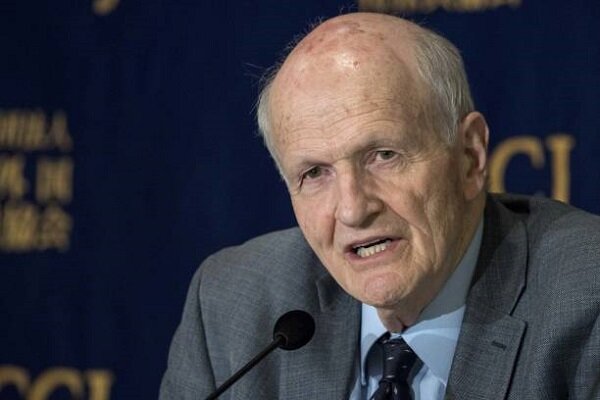Biden should not have delayed rejoining JCPOA: ex-White House official
“France provided the nuclear reactor and secretly the plutonium separation plant to Israel”

TEHRAN – A nuclear physicist and professor of public and international affairs at Princeton University says that the Joe Biden administration should have rejoined the 2015 Iran nuclear deal immediately after it started its work.
“The Biden administration should not have delayed rejoining the JCPOA in parallel to Iran coming back into compliance and should not have added requirements of additional negotiations on ballistic missiles and regional activities,” Frank Von Hippel tells the Tehran Times.
Hippel believes that the United States’ unilateral exit from the Joint Comprehensive Plan of Action has had a detrimental effect on the stability of West Asia.
“Trump taking the U.S. out of the JCPOA was very destructive to the nuclear nonproliferation regime and potentially to stability in the Middle East (West Asia),” Hippel adds.
Now the U.S. is less reliable of a partner than it was before Trump and Biden. This may be the new political reality in the U.S.
Frank Von Hippel says Biden “should not have added requirements of additional negotiations on ballistic missiles and regional activities” to a revival of the JCPOA. The Trump administration left certain international agreements, including the Paris climate accord and the 2015 Iran nuclear deal, but talks started to restore the nuclear deal in April 2021 after Biden, who took over as president in January 2021, announced that the U.S. is willing to rejoin the multilateral agreement backed by UN Security Council Resolution 2231.
Talks are still underway in Vienna and some progress has been made, but it could have been resumed sooner without accusing Iran of prolonging the negotiations.
Following is the text of the interview with Frank Von Hippel, who was responsible for national security issues in the White House Office of Science and Technology Policy from 1993 to 1994:
Q: In a recent interview Noam Chomsky has called Iran and China "alleged threats" to U.S. interests. He has said that the problem is the existence of Iran and China that can challenge U.S. hegemony, not their threat. What is your comment?
A: I think the Iranian and Chinese cases are very different.
In the case of Iran, the primary focus of the U.S. government is on the danger of Iran acquiring nuclear weapons in the context of its apparent hostility to Israel (evidenced by Iran’s support of Hamas, Hezbollah, and Syria).
I don’t think Iran would use nuclear weapons on Israel, but I am also against any country, including the United States and Israel, having nuclear weapons.
China’s peaceful economic rise under Deng Xiaoping and his successors was a wonder. The recent turn under Xi Jinping toward repression internally and “wolf-warrior diplomacy” abroad is a concern. In this context, the U.S. focus on maintaining dominance in China’s neighborhood has created a danger of collision and war. I worry particularly about the possibility of war if Xi Jinping decides it is time to suppress local autonomy in Taiwan as he recently did in Hong Kong.
Q: Republicans and some Democrats have been trying to block Biden when it comes to revving the nuclear pact. Given this fact, do you think the Biden administration is capable of restoring the JCPOA?
A: I hope it will be possible to revive the JCPOA. I think the most promising approach would be step-by-step compliance for compliance to increase mutual confidence.
Q: Do you think there is a possibility of Israeli attacks on Iran’s nuclear facilities without a U.S. green light?
A: I worry that Israel’s attacks on Iran’s nuclear experts and facilities and Iran’s understandable reactions to those attacks have made negotiations more difficult, but I hope that, with Netanyahu sidelined, the recognition by Israel’s security establishment that the JCPOA is in Israel’s security interest will be given more weight.
Q: Some American officials believe the disastrous situation that all parties to the JCPOA are facing is the result of Trump's “maximum pressure” policy against Iran. In your view, to what extent can we blame Trump and his administration in this regard while the Biden administration actually failed to start nuclear talks timely?
A: I think both these points are valid. Trump taking the U.S. out of the JCPOA was very destructive to the nuclear nonproliferation regime and potentially to stability in the Middle East (West Asia). And the Biden administration should not have delayed rejoining the JCPOA in parallel to Iran coming back into compliance and should not have added requirements of additional negotiations on ballistic missiles and regional activities.
Q: In his interview, Chomsky proposed an initiative called "nuclear-weapons-free zone in West Asia. He said "everyone is in favor of that, including Iran. The U.S. blocks it because they would have to open up Israeli nuclear weapons to inspection, and the U.S. won't permit that." How could it be justified in the U.S.?
A: Israel acquired nuclear weapons without U.S. support. France provided the nuclear reactor and (secretly) the plutonium separation plant.
Israel has set as a condition on giving up its nuclear weapons that all its neighbors accept Israel’s right to exist. I assume it also has the condition that none of its neighbors have nuclear weapons either.
The original problem Israel’s neighbors had with Israel was its expulsion of the Palestinians. Now the focus is more that the Palestinians have their own state. Unfortunately, Israel is split internally on giving that to the Palestinians and is slowly allowing Israeli settlers to
Leave a Comment